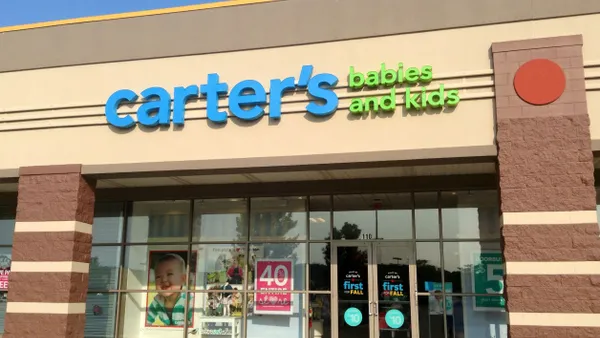Dive Brief:
-
Tiffany shares slumped 5.6% Wednesday morning after the American jeweler reported first quarter worldwide net sales rose 1% to $900 million, thanks to growth in Asia-Pacific and wholesale sales, while same-store sales fell 3% year over year. Consensus Metrix analysts had forecast a 1.1% rise in same-store sales, according to Reuters.
-
In the Americas, Q1 total sales fell 3% to $392 million while same-store sales fell 4% (with no impact from currency fluctuations) due to lower spending by both foreign tourists and local customers, according to a company press release. In the Asia-Pacific region, Q1 total sales rose 8% to $257 million, thanks to strong growth in mainland China and varying degrees of softness in other markets, while same-store sales fell 3%. On a constant-exchange-rate basis, total sales rose 9% and same-store sales fell 2%, the company said.
-
For the full year, the company expects worldwide net sales to rise over the prior year by a low-single-digit percentage (on a constant-exchange-rate basis) and net earnings per diluted share to rise by a high-single-digit percentage over last year.
Dive Insight:
Tiffany chairman and interim CEO Michael Kowalski on Wednesday said the jeweler’s first quarter results "modestly exceeded … near-term expectations.”
“[W]e are focused on executing long-term strategies to achieve stronger and sustainable performance through product introductions, optimization of our store base, effective marketing communications and the delivery of experiences that resonate with our customers,” he said in a statement. “In so doing, we believe Tiffany & Co. is well-positioned to generate an attractive total shareholder return over the long-term.”
Tiffany has been scrambling in recent quarters as tourist sales have dropped off due to the strong dollar. The company has moved more assertively online, inking a deal with Net-A-Porter to reach millennials without resorting to price reductions. The iconic American jeweler’s flagship New York City store also finds itself at a disadvantage thanks to its proximity to Trump Tower, which has seen protests and a security maelstrom since the November presidential election. Tiffany has taken steps to mitigate the impact of increased security on its nearby flagship store’s sales and traffic, including putting up NYPD barricades draped in monogrammed Tiffany-blue cloth to create a path for customers.
Frederic Cumenal stepped down as chief in February amid the struggles, the latest in a series of changes across Tiffany's executive suite. In September, the company named Mark Erceg, former chief financial officer of Canadian Pacific Railway, as its CFO; he replaced Ralph Nicoletti, who left after just two years to become CFO of consumer products company Newell Brands. Last month, Tiffany promoted Reed Krakoff to the newly created role of chief artistic officer. Krakoff, who spent 17 years as the creative director of accessories retailer Coach, held a senior design role at Ralph Lauren, before serving as a creative collaborator for Tiffany with the relaunch of a luxury accessories collection.














